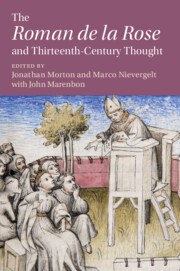Book contents
- The Roman de la Rose and Thirteenth-Century Thought
- Cambridge Studies in Medieval Literature
- The Roman de la Rose and Thirteenth-Century Thought
- Copyright page
- Contents
- Contributors
- Acknowledgements
- Note on Primary Texts
- Introduction
- Part I Epistemology and Language
- Chapter 1 Mechanisms of Belief
- Chapter 2 Visual Experiences and Allegorical Fiction
- Chapter 3 Imposition, Equivocation, and Intention
- Chapter 4 Sophisms and Sophistry in the Roman de la Rose
- Part II Natural Law, Politics, and Society
- Part III Unfinished Business
- Notes
- Bibliography
- Index
- Cambridge Studies in Medieval Literature
Chapter 1 - Mechanisms of Belief
Jean de Meun’s Implicit Epistemology
from Part I - Epistemology and Language
Published online by Cambridge University Press: 17 June 2020
- The Roman de la Rose and Thirteenth-Century Thought
- Cambridge Studies in Medieval Literature
- The Roman de la Rose and Thirteenth-Century Thought
- Copyright page
- Contents
- Contributors
- Acknowledgements
- Note on Primary Texts
- Introduction
- Part I Epistemology and Language
- Chapter 1 Mechanisms of Belief
- Chapter 2 Visual Experiences and Allegorical Fiction
- Chapter 3 Imposition, Equivocation, and Intention
- Chapter 4 Sophisms and Sophistry in the Roman de la Rose
- Part II Natural Law, Politics, and Society
- Part III Unfinished Business
- Notes
- Bibliography
- Index
- Cambridge Studies in Medieval Literature
Summary
It is a given that Jean de Meun, like many other medieval authors of vernacular works received a university training in philosophy. This chapter’s aim is to reconstruct Jean de Meun’s implicit epistemology, i.e. to identify how the classic concepts of medieval epistemology are mobilised to give an account of the cognitive phenomena that are treated by the Rose’s different protagonists. Insofar as Jean subscribes to a classically Aristotelian framework marked by the difficulty of getting to grips with belief, particular importance will be given to the analysis of uncertain cognitive phenomena, especially in its anthropological dimensions, focusing notably on the famous passage concerning Dame Habonde. The aim of these analyses, finally, is to determine if Jean’s writing strategies are, in one way or another, linked to his epistemological choices.
- Type
- Chapter
- Information
- The ‘Roman de la Rose' and Thirteenth-Century Thought , pp. 27 - 44Publisher: Cambridge University PressPrint publication year: 2020

